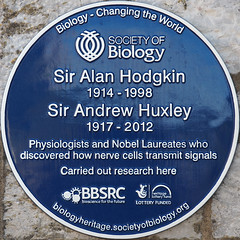Sir Andrew Huxley OM PRS FRS


Sir Andrew Huxley OM PRS FRS
(1917-2012)
physiologist, Fellow of the Royal Society (from 1955), Nobel Physiology or Medicine Laureate (from 1963), Knight Bachelor (from 1974), 55th President of the Royal Society (1980-1985), and Order of Merit recipient (from 1983)
Family tree
Commemorated on 2 plaques
Sir Alan Hodgkin 1914-1998 Sir Andrew Huxley 1917-2012 Physiologists and Nobel Laureates who discovered how nerve cells transmit signals carried out research here
Marine Biological Association, The Laboratory, Citadel Hill, Plymouth, United Kingdom where they worked
In this building E. D. Adrian first recorded impulses from single nerve fibres, and A. L. Hodgkin & A. H. Huxley determined their mechanism and principles of conduction, transforming our understanding of how the nervous system processes information.
University of Cambridge, Downing Street, CB2 3DY, Cambridge, United Kingdom where they was


